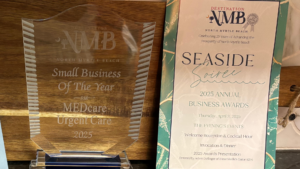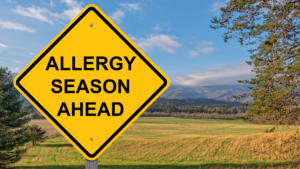Emergencies like natural disasters and outbreaks of various diseases can happen at any time. Since they can have widespread and long-lasting impacts on services, supplies, and health care systems, it’s good to prepare for the possibility of an emergency before it happens. Supplies, survival skills, and the self-confidence to react in the moment can be the difference in how you fare during an emergency. Crucial and limited resources include things like power sources, prescriptions, paperwork, survival items, and practical skills. See below for some examples of things to consider to prepare for emergencies!
Power Sources:
- Warm clothes, blankets, sleeping bags, and emergency blankets to keep warm in cold temperatures
- Extra batteries
- A flashlight, battery-powered lantern, or a head lamp
- Hearing aid batteries
- Car chargers, adapters, and power banks for home use devices and equipment
- A power generator with at least 20 feet of extension cord(s) for outdoor use and enough fuel to keep it running
- Appliance thermometers for refrigerator/freezer
- Surge protector power strip
Prescriptions:
- A list of your and your family’s prescription medicines. Include information on each diagnosis, frequency, dosage, allergies, and medical supply needs.
- Talk to your provider or pharmacist about how you can create an emergency supply of prescriptions/medications.
- A cooler and chemical ice packs to chill medicines that must be kept refrigerated
- Nonprescription drugs, like antidiarrheal medicines, antihistamines, and pain/fever relievers
Paperwork:
- Vital records including birth and death certificates
- Personal identification such as Passport, Driver’s License, Social Security Card
- Copies of insurance cards and medical records, such as heath insurance card and immunization/vaccination records
- Copies of personal care plans, such as food allergy plan, asthma action plan, complete care plan, cancer survivorship care plans, advance directives, and emergency care plan for children with special health needs
- Cash in small denominations in case ATMs and pay-at-the-pump gas systems are out of order
Personal Needs:
- Emergency water supply
- Emergency food supply
- Home-use medical devices, such as blood sugar monitor, asthma inhaler, assistive technologies (glasses, hearing aids, walker, wheelchair), contact lenses and disinfecting solution, and epinephrine autoinjector
- Medical supplies, such as blood test strips, syringes, catheters, antibacterial wipes, and nasal cannulas
- First aid supplies, such as first aid kit, non-latex gloves, waterproof bandages and gauze, antibiotic cream or ointment, tweezers and scissors, and a thermometer that is easy to read/use
Practical Skills:
- Learn how to create and store an emergency food and water supply.
- Learn the right way to wash your hands. Handwashing is one of the best ways to protect you, your family, and others from getting sick.
- Learn how to use a portable generator safely to prevent carbon monoxide poisoning.
- Learn how to perform cardiopulmonary resuscitation (CPR) and how to use an automated external defibrillator (AED) until help arrives.
- To help slow the spread of respiratory illnesses, learn personal nonpharmaceutical interventions.
If you aren’t feeling well remember your local MEDcare is always happy to help! Our urgent care centers are open every day of the week 8:00 am to 8:00 pm- No appointment necessary! From 8am to 6pm we offer Rapid Antigen and send-out PCR COVID-19 testing, as well as COVID-19 antibody testing. To be seen by a provider, simply walk in, or save your spot online for visits between 8am and 6pm by clicking here! For information on E-registration to save time click here. Telemedicine options are available here. We look forward to helping you Get Better. Faster!

